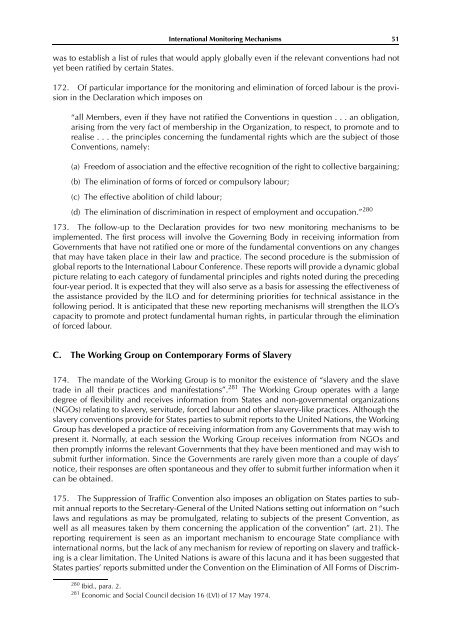Slavery in The 21st Century
Slavery in The 21st Century
Slavery in The 21st Century
You also want an ePaper? Increase the reach of your titles
YUMPU automatically turns print PDFs into web optimized ePapers that Google loves.
International Monitor<strong>in</strong>g Mechanisms 51<br />
was to establish a list of rules that would apply globally even if the relevant conventions had not<br />
yet been ratified by certa<strong>in</strong> States.<br />
172. Of particular importance for the monitor<strong>in</strong>g and elim<strong>in</strong>ation of forced labour is the provision<br />
<strong>in</strong> the Declaration which imposes on<br />
“all Members, even if they have not ratified the Conventions <strong>in</strong> question . . . an obligation,<br />
aris<strong>in</strong>g from the very fact of membership <strong>in</strong> the Organization, to respect, to promote and to<br />
realise . . . the pr<strong>in</strong>ciples concern<strong>in</strong>g the fundamental rights which are the subject of those<br />
Conventions, namely:<br />
(a) Freedom of association and the effective recognition of the right to collective barga<strong>in</strong><strong>in</strong>g;<br />
(b) <strong>The</strong> elim<strong>in</strong>ation of forms of forced or compulsory labour;<br />
(c) <strong>The</strong> effective abolition of child labour;<br />
(d) <strong>The</strong> elim<strong>in</strong>ation of discrim<strong>in</strong>ation <strong>in</strong> respect of employment and occupation.” 280<br />
173. <strong>The</strong> follow-up to the Declaration provides for two new monitor<strong>in</strong>g mechanisms to be<br />
implemented. <strong>The</strong> first process will <strong>in</strong>volve the Govern<strong>in</strong>g Body <strong>in</strong> receiv<strong>in</strong>g <strong>in</strong>formation from<br />
Governments that have not ratified one or more of the fundamental conventions on any changes<br />
that may have taken place <strong>in</strong> their law and practice. <strong>The</strong> second procedure is the submission of<br />
global reports to the International Labour Conference. <strong>The</strong>se reports will provide a dynamic global<br />
picture relat<strong>in</strong>g to each category of fundamental pr<strong>in</strong>ciples and rights noted dur<strong>in</strong>g the preced<strong>in</strong>g<br />
four-year period. It is expected that they will also serve as a basis for assess<strong>in</strong>g the effectiveness of<br />
the assistance provided by the ILO and for determ<strong>in</strong><strong>in</strong>g priorities for technical assistance <strong>in</strong> the<br />
follow<strong>in</strong>g period. It is anticipated that these new report<strong>in</strong>g mechanisms will strengthen the ILO’s<br />
capacity to promote and protect fundamental human rights, <strong>in</strong> particular through the elim<strong>in</strong>ation<br />
of forced labour.<br />
C. <strong>The</strong> Work<strong>in</strong>g Group on Contemporary Forms of <strong>Slavery</strong><br />
174. <strong>The</strong> mandate of the Work<strong>in</strong>g Group is to monitor the existence of “slavery and the slave<br />
trade <strong>in</strong> all their practices and manifestations”. 281 <strong>The</strong> Work<strong>in</strong>g Group operates with a large<br />
degree of flexibility and receives <strong>in</strong>formation from States and non-governmental organizations<br />
(NGOs) relat<strong>in</strong>g to slavery, servitude, forced labour and other slavery-like practices. Although the<br />
slavery conventions provide for States parties to submit reports to the United Nations, the Work<strong>in</strong>g<br />
Group has developed a practice of receiv<strong>in</strong>g <strong>in</strong>formation from any Governments that may wish to<br />
present it. Normally, at each session the Work<strong>in</strong>g Group receives <strong>in</strong>formation from NGOs and<br />
then promptly <strong>in</strong>forms the relevant Governments that they have been mentioned and may wish to<br />
submit further <strong>in</strong>formation. S<strong>in</strong>ce the Governments are rarely given more than a couple of days’<br />
notice, their responses are often spontaneous and they offer to submit further <strong>in</strong>formation when it<br />
can be obta<strong>in</strong>ed.<br />
175. <strong>The</strong> Suppression of Traffic Convention also imposes an obligation on States parties to submit<br />
annual reports to the Secretary-General of the United Nations sett<strong>in</strong>g out <strong>in</strong>formation on “such<br />
laws and regulations as may be promulgated, relat<strong>in</strong>g to subjects of the present Convention, as<br />
well as all measures taken by them concern<strong>in</strong>g the application of the convention” (art. 21). <strong>The</strong><br />
report<strong>in</strong>g requirement is seen as an important mechanism to encourage State compliance with<br />
<strong>in</strong>ternational norms, but the lack of any mechanism for review of report<strong>in</strong>g on slavery and traffick<strong>in</strong>g<br />
is a clear limitation. <strong>The</strong> United Nations is aware of this lacuna and it has been suggested that<br />
States parties’ reports submitted under the Convention on the Elim<strong>in</strong>ation of All Forms of Discrim-<br />
280 Ibid., para. 2.<br />
281 Economic and Social Council decision 16 (LVI) of 17 May 1974.

















